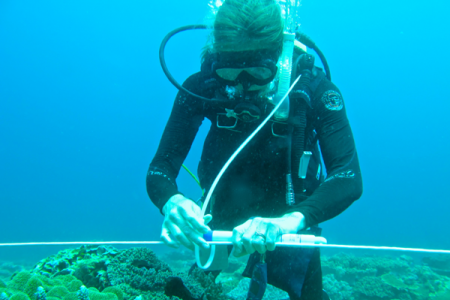UCI Scientist Recounts South China Sea Coral Death
 March 23, 2017 - A South China Sea atoll lost nearly half of its living coral in one summer due to spiking ocean temperatures and stagnant weather, according to new research by Kristen Davis. UCI assistant professor of Earth system science and civil & environmental engineering and colleagues. The findings in Scientific Reports describe how a two-degree-Celsius rise in surface temperatures in the South China Sea was amplified by weather conditions and local circulation to a six-degree increase at Dongsha Atoll, a shallow coral reef ecosystem. The rapid and extreme climb in temperature killed approximately 40% of the resident coral community in the summer of 2015. “Coral reefs are dying due to temperature stress all over the world,” said Davis. “We were studying the atoll because it has some of the Earth’s fastest growing coral.” While taking measurements to better understand how local oceanographic conditions might play a role in the extreme growth rates, Davis and fellow researchers witnessed the sudden jump in water temperatures at the reef. Water on the shallow reefs of the atoll is normally cooled by surface waves and ocean currents, but a period of low winds and waves allowed the water around the reef to accumulate heat, leading instead of a growth spurt to widespread coral death. In addition to describing the process by which climate and weather can cause mortality in ocean habitats, the study sounds an immediate alarm bell. “These results indicate that efforts to keep ocean warming to within 2 degrees Celsius of pre-industrial levels do not take into account the compounding effects of local weather and water flow conditions,” said Davis. “These targets may not be ambitious enough to avoid large scale coral mortality.” The work was led by Woods Hole Oceanographic Institution and researchers from Taiwan’s Academia Sinica also participated.
March 23, 2017 - A South China Sea atoll lost nearly half of its living coral in one summer due to spiking ocean temperatures and stagnant weather, according to new research by Kristen Davis. UCI assistant professor of Earth system science and civil & environmental engineering and colleagues. The findings in Scientific Reports describe how a two-degree-Celsius rise in surface temperatures in the South China Sea was amplified by weather conditions and local circulation to a six-degree increase at Dongsha Atoll, a shallow coral reef ecosystem. The rapid and extreme climb in temperature killed approximately 40% of the resident coral community in the summer of 2015. “Coral reefs are dying due to temperature stress all over the world,” said Davis. “We were studying the atoll because it has some of the Earth’s fastest growing coral.” While taking measurements to better understand how local oceanographic conditions might play a role in the extreme growth rates, Davis and fellow researchers witnessed the sudden jump in water temperatures at the reef. Water on the shallow reefs of the atoll is normally cooled by surface waves and ocean currents, but a period of low winds and waves allowed the water around the reef to accumulate heat, leading instead of a growth spurt to widespread coral death. In addition to describing the process by which climate and weather can cause mortality in ocean habitats, the study sounds an immediate alarm bell. “These results indicate that efforts to keep ocean warming to within 2 degrees Celsius of pre-industrial levels do not take into account the compounding effects of local weather and water flow conditions,” said Davis. “These targets may not be ambitious enough to avoid large scale coral mortality.” The work was led by Woods Hole Oceanographic Institution and researchers from Taiwan’s Academia Sinica also participated.
- Brian Bell / UCI
